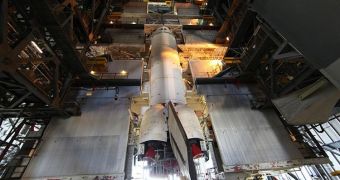Officials at the American space agency announce that the space shuttle Discovery will be rolled out to its launch facilities on Monday, January 31, in preparation for a February 24 launch opportunity.
They add that the engineering crews at the Kennedy Space Center (KSC), in Florida, finished the necessary repairs, that forced the orbiter's initially-planned launch date to slip back by several months.
The orbiter was first rolled out the the KSC Launch Pad 39A complex in October 2010, for an early November take-off date. But it was rolled back into the Vehicle Assembly Building (VAB) in December, for advanced repair work.
NASA experts say that the move was prompted by the number of cracks that were discovered in the spacecraft's orange external fuel tank (EFT), which carries its supplies of liquid cryogenic fuel.
Leaks from this component could have caused a disaster similar to the one the space shuttle Challenger was involved in. NASA has strict safety procedures in place now, that are meant avoid such scenarios from repeating themselves.
Once back in the VAB, engineers carried out detailed X-ray scans of the EFT, in search for small or developing cracks. Following the extensive analysis, it was discovered that this particular tank had been made from a batch of structurally-weaker material.
The following weeks were spent adding more material to areas that will be subjected to the largest amounts of stress during launch. Repair crews have just finished their work, and so the shuttle is now ready to be rolled to its launch pad again.
Discovery's STS-133 flight to the International Space Station (ISS) is scheduled to be its last. After it returns to the KSC, the orbiter will have all its hazardous substances removed, and then shipped to the Smithsonian National Air and Space Museum, in Washington DC.
Until then, it must deliver the Multipurpose Logistics Module Leonardo to the orbital facility. It also carried the Robonaut 2 robot, which was developed by NASA in partnership with General Motors.
Due to the fact that its launch has been delayed by such a long time, shuttle Endeavor's launch schedule was also changed. Originally planned to take off in February, the orbiter is now aiming for an April launch date for its final flight.
The last shuttle flight ever will be carried out by Atlantis, and will blast off on the final resupply mission to the ISS on June 28. After 12 days in space, the spacecraft will return home, putting an end to the NASA Space Shuttle Program after nearly three decades of operations.

 14 DAY TRIAL //
14 DAY TRIAL //